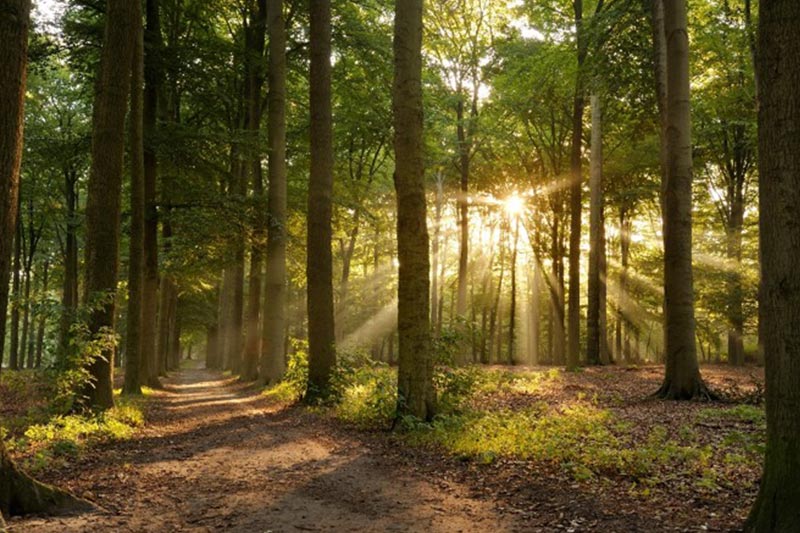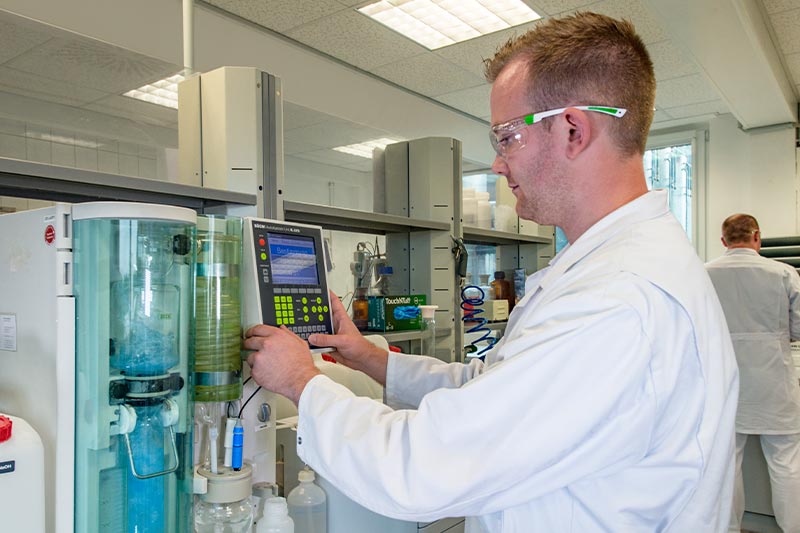How wheat starch is produced with environmental awareness.
Environmental awareness is a top priority in the production of our wheat-based raw materials wheat starch, wheat proteins, wheat extracts, wheat bran and wheat fibres. Not only wheat, as a natural raw material, is characterised by high sustainability. Our workflow sequences and processes also take into account the pursuit of maximum sustainability. Since our founding more than 160 years ago, Crespel & Deiters has pursued a sustainable innovation strategy and a responsible environmental policy that focuses on low resource consumption. Within the context of globalisation and the increasing demand for resources, sustainable management is a binding obligation for the activities of Crespel & Deiters in the future too. Combined with the claim to continuous improvement and increased efficiency, this is a cornerstone for the successful continuation of the company.
High environmental awareness in the production of wheat starch.
Wheat is a renewable and natural agricultural raw material. Thus, nature provides us with infinite resources for the development of our variety of products such as wheat starch. We do everything we can to make the best possible use of these opportunities offered by wheat, while at the same time protecting the environment and acting with a high degree of sustainability. This is why highest standards and fixed rules apply regarding its provenance, sourcing and processing.

Environmental awareness
Environmental awareness
With state-of-the-art technology and efficient water recycling, we have reduced the use of fresh water by more than half in the past ten years. In addition, we obtain our thermal and electrical energy from natural gas in a highly efficient and highly effective way by using combined heat and power generation.

Efficiency
Efficiency
The efficiency with which the raw material is used is also of great importance when it comes to increasing sustainability in production. Each constituent part of wheat is important and performs different tasks. With the optimisation of production and machinery efficiency, we at the Crespel & Deiters Group utilise 99 % of the wheat grain.
Sustainability and environmental awareness with the production wheat starch.
As part of Crespel & Deiters’ corporate environmental management, sustainability in the production of our wheat-based raw materials such as wheat starch and wheat proteins, as well as environmentally responsible manners, have been central corporate goals from the very beginning. Therefore we implemented an environmental management system in 2000 that is based on the standard ISO 14001, and expanded it in 2013 to include an energy management system in accordance with ISO 50001. All environmental activities are scheduled, monitored and regularly reviewed under the provisions of this standard. Our engagement specifically targets the following aspects:
Water management
Over the past 10 years, following the introduction of state-of-the-art technology and an efficient water recycling system, the consumption of fresh water has been reduced by more than half.
Emissions
Air and water-borne emissions are many times below the statutory target values as the result of safe and efficient separation and cleaning systems.
Waste
Avoidance is the most important aspect of the waste management system applied by all our employees. Unavoidable waste is collated separately and fed into recycling processes as far as possible. This means not only that waste is reduced, but that what remains is recovered for recycling.
Energy use
With the use of a CHP plant, the thermal energy required for the starch production process and the electrical energy are obtained from natural gas in a highly efficient way and with a high efficiency of 90%. The use of modern machinery and equipment as well as the continuous optimisation of all processes are the foundation of ongoing reductions in specific energy demands.
Our environmental management at a glance:
- Use of the whole wheat grain
- Highest possible energy yield through efficient energy generation in our own CHP plants
- Fresh spring water from our own springs in the nearby Teutoburg Forest
- Efficient water recycling and lowest possible water consumption

Award by the federal state of NRW: Trailblazer in climate protection in the federal state of NRW
Already in 2016, the Crespel & Deiters Group was distinguished with the first “EnergieInnovationsPreis.NRW” by EnergieAgentur.NRW. With its new award, the EnergyAgency.NRW is distinguishing companies which can demonstrate successful innovative projects in the field of energy management systems. Furthermore, Crespel & Deiters was included in the ClimateExpo.NRW exhibition as a trailblazer in climate protection in 2019. Since 2014, the state initiative has been awarding the prize to projects and players who respond to the challenges of climate protection with particular commitment, and who illustrate the positive effects of climate protection measures for the economy, the environment and society in North Rhine-Westphalia particularly well.

Efficient energy management – less is more
The continuous optimisation of our energy management also includes the exchange of best practice with other companies. The Crespel & Deiters Group participates in the energy efficiency network REGINEE, which was set up by the Chamber of Industry and Commerce Osnabrück – Emsland – County Bentheim in cooperation with the Federal Association of Energy Consumers (VEA) in Hanover. Thus, the Crespel & Deiters Group is participating in the joint goal of the German government and industry to establish 500 such networks by 2020. The companies in the network set themselves the goal of saving 11.8 GWh within four years, thereby making an active contribution to climate protection. This goal was clearly exceeded! A saving of 16.8 GWh and 4,800 t CO2 was achieved. With annual savings of up to 2.6 GWh, Crespel & Deiters was able to make a considerable contribution toward reaching this target.
Find out more on the energy efficiency network REGINEE